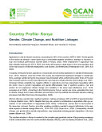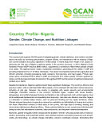Nature-Positive Solutions Initiative baseline evaluation survey report: India
Geoffrey, Baragu · Azzarri, Carlo · Boukaka, Sedi-Anne · de Falcis, Eleonora · Ferguson, Nathaniel
Μαρ 2025 · Intl Food Policy Res Inst
ebook
33
Σελίδες
family_home
Κατάλληλο
info
reportΟι αξιολογήσεις και οι κριτικές δεν επαληθεύονται Μάθετε περισσότερα
Σχετικά με το ebook
The pressing need to achieve sustainable agriculture and mitigate climate change has led to a growing recognition of the importance of nature-based solutions (NBS). Defined as interventions that leverage the protective, restorative, and regulatory functions of ecosystems (Cohen-Shacham et al., 2016), NBS offers a holistic approach to addressing a range of environmental and societal challenges. This framework positions humans as active stewards of ecosystems rather than passive beneficiaries. Industrial agriculture, in prioritizing mass-scale food production, has exacted a heavy toll on both the environment and human well-being. Miralles-Wilhelm and Iseman (2021) report that 52 percent of global agricultural lands suffer from moderate to severe degradation due to unsustainable practices, contributing to 25 percent of global greenhouse gas emissions. Moreover, industrial agriculture drives 80 percent of deforestation, threatens 86 percent of the 28,000 species currently at risk of extinction (through habitat conversion and pollution), and accelerates soil and water degradation. The use of chemical inputs, monocropping, and poor waste management further compromise nutrition, reduce crop resilience, and depress farming incomes. These challenges highlight the urgent need to transition toward resilient, nature positive agricultural systems capable of sustaining smallholder farmers and ensuring that agriculture becomes a net contributor to environmental restoration. In response, the One CGIAR initiative, "Nature-positive solutions for shifting agri-food systems to more resilient and sustainable pathways" (NATURE+), seeks to enhance the adoption of nature-positive solutions (NPS) to promote sustainable agricultural productivity. NATURE+ addresses key systemic barriers in three areas: (1) land degradation and resource depletion, (2) limited evidence and knowledge gaps within the agricultural research for development (AR4D) community, and (3) the lack of viable business models to drive public-private partnerships in sustainable agriculture. While the harmful impacts of industrial agriculture are well documented, the AR4D community lacks robust evidence and tailored tools to support NPS planning. The 2021 UN Food Systems Summit and the COVID-19 pandemic have further underscored the need for systemic transformation. The 2020 World Economic Forum report, "The Future of Nature and Business," estimates that NPS could create 395 million jobs by 2030, but achieving this potential requires substantial investment in evidence-based innovation and decision-support tools for biodiversity enhancement, soil management, waste management, and water conservation.
Αξιολογήστε αυτό το ebook
Πείτε μας τη γνώμη σας.
Πληροφορίες ανάγνωσης
Smartphone και tablet
Εγκαταστήστε την εφαρμογή Βιβλία Google Play για Android και iPad/iPhone. Συγχρονίζεται αυτόματα με τον λογαριασμό σας και σας επιτρέπει να διαβάζετε στο διαδίκτυο ή εκτός σύνδεσης, όπου κι αν βρίσκεστε.
Φορητοί και επιτραπέζιοι υπολογιστές
Μπορείτε να ακούσετε ηχητικά βιβλία τα οποία αγοράσατε στο Google Play, χρησιμοποιώντας το πρόγραμμα περιήγησης στον ιστό του υπολογιστή σας.
eReader και άλλες συσκευές
Για να διαβάσετε περιεχόμενο σε συσκευές e-ink, όπως είναι οι συσκευές Kobo eReader, θα χρειαστεί να κατεβάσετε ένα αρχείο και να το μεταφέρετε στη συσκευή σας. Ακολουθήστε τις αναλυτικές οδηγίες του Κέντρου βοήθειας για να μεταφέρετε αρχεία σε υποστηριζόμενα eReader.








